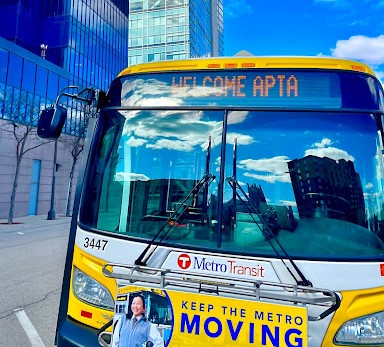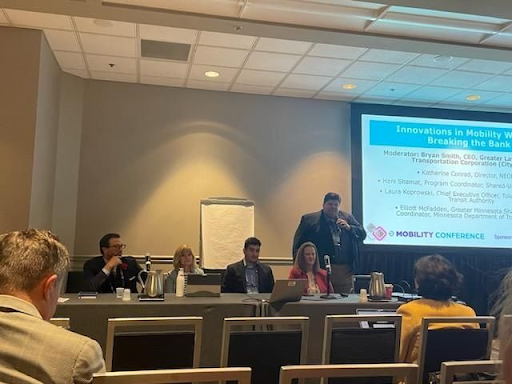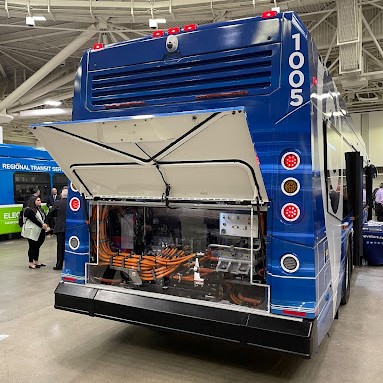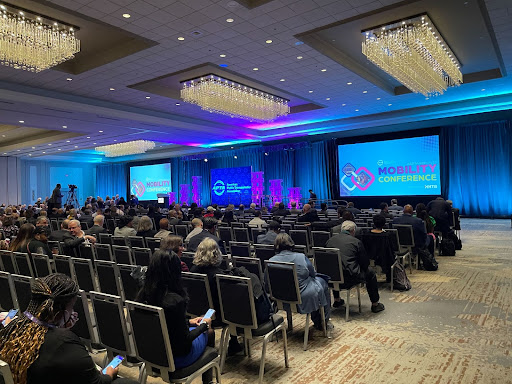Event Recap: APTA Mobility Conference, Minneapolis, MN
By Shared-Use Mobility Center
May 1, 2023
As transit agencies work to improve their service, grow their presence, and innovate, convening with peer agencies is invaluable. Forums where agency representatives, private mobility providers, and transportation advocates work together to address problems and find solutions can help spur innovation and move the transportation industry forward. The American Public Transportation Association (APTA), a trade association representing public transportation in the United States, convened agencies from across the country for its Mobility Conference on April 24-26th, 2023, in Minneapolis, Minnesota. APTA’s Mobility Conference aimed to address critical challenges and priorities in the transportation landscape through panel discussions, workshops, and field trips.

Hani Shamat represented the Shared-Use Mobility Center (SUMC) at the conference and participated on a panel entitled “Innovations in Mobility Without Breaking the Bank” along with Katherine Conrad, Director of NEORide, Laura Koprowski, Chief Executive Officer of the Toledo Area Regional Transit Authority (TARTA), and Elliott McFadden, Greater Minnesota Shared Mobility Coordinator with the Minnesota Department of Transportation (MnDOT). Each panelist discussed innovative projects they were involved with, including: NEORide’s continued work building a consortium of over 15 agencies across multiple states; TARTA’s microtransit pilot, TARTA Flex; and MnDOT’s new programs helping rural agencies in the state deploy new fleet models and partner with other mobility providers. Hani showcased the work of SUMC’s Mobility Innovation Collaborative (MIC) program, highlighting a few innovative MIC projects, discussing key takeaways from the program, and sharing case studies of MIC projects featured at the Mobility Learning Center.

A Few Key Takeaways from the APTA Mobility Conference…
Partnerships are Still Vital for Mobility Innovation
Throughout the APTA Mobility Conference, it was clear that agency partnerships with private technology and mobility companies, local governments, and community-based organizations are key to making mobility projects successful. This was evident in many sessions, as agencies discussed how their projects moved forward through collaboration. In particular, the aforementioned panel, “Innovative Mobility Without Breaking the Bank,” highlighted cases like NEORide of transit agencies joining together as a consortium to better tackle problems collectively, and examples of agencies partnering with health and human services to solve more than just transportation issues. Partnership building was also discussed in a session on equity-focused microtransit, as panelists recognized the importance of building relationships with community-based organizations to achieve equity goals. Furthermore, APTA hosted a walking tour of downtown Minneapolis to explore agency and city coordination in balancing the needs of transit facilities with other roadway uses, and how Metro Transit and its municipal partners coordinate to improve transportation service.
Moving Fast Towards Bus Fleet Electrification
Agencies are more focused than ever on transitioning from diesel fuel buses to battery electric buses, especially in light of the zero-emission vehicle programs put forth in the Infrastructure Investment and Jobs Act. The APTA Mobility Conference allowed for agencies and bus manufacturers to showcase their work and share their strategies and successes in fleet electrification. In addition to a bus display where vendors showcased their electric vehicles, APTA hosted a session on “Creative Solutions to Scaling Up Your BEB Infrastructure,” which detailed how to manage facility modification to handle the charging infrastructure needed for large fleets of battery electric buses. There were also tours of Metro Transit’s electric bus ready North Loop Garage and a site visit to some of Metro Transit’s on-route charging infrastructure with Metro Transit’s technical team discussing lessons learned from a battery-electric bus pilot program and the agency’s proposed Zero Emission Bus Transition plan.

“We All Belong” – Making Sure Public Transportation Works for Everyone
A major theme permeating throughout the conference was ensuring public transit evolves to be more equitable, accessible, and inclusive. Several sessions highlighted these efforts, with topics on how microtransit can serve as an equity tool bridging the first and last mile gap, how to keep equity as a focus when working to shift payment systems, and how agencies can be intentional about working with communities to help meet their goals.
One plenary panel included representatives from LA Metro, the Maryland Transit Administration, and San Francisco’s Bay Area Rapid Transit (BART) with The Betti Ono Foundation to discuss safety, security, identity, and comfort, and demonstrate some of each group’s efforts to address harassment on public transit to make their services safer and more welcoming, including hiring ambassadors and targeted marketing campaigns.In a session about accessible wayfinding, presenters discussed some of the challenges people with disabilities face in navigating to and from transit stops. In this session, Matthew Weidner, Senior Strategic Planner and Systems Analyst for King County Metro, Ricky Zhang, Graduate Student in Electrical and Computer Engineering at the University of Washington, Nirit Glazer, CEO of Looking Bus, and Marty Watts, Vice-President of Sales from Aira, presented on strategies for more effective sidewalk classification, new sidewalk mapping technologies, new wayfinding technologies for visually impaired riders, and creating safer and more inclusive bus rides for people with disabilities.

Conclusion
In-person knowledge sharing is invaluable for moving the transit industry forward. The APTA Mobility Conference brought together agencies, researchers, private mobility companies, consultants, non-profit organizations, and other experts to share their experiences and learn from each other both through informative conference sessions and more informal hallway discussions.
To stay up to date on details of upcoming events and trends in the mobility industry, subscribe to SUMC’s Mobility Hub Newsletter.
Send questions, comments, and recommendations to: mic@sharedusemobilitycenter.org.